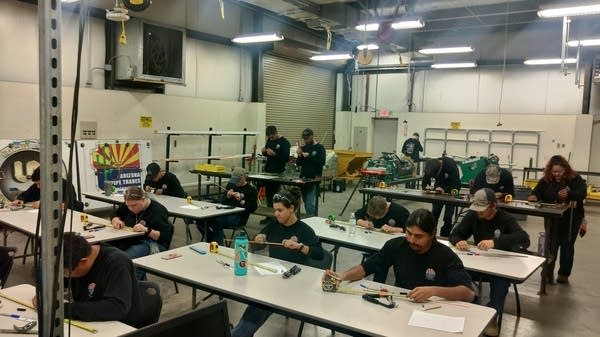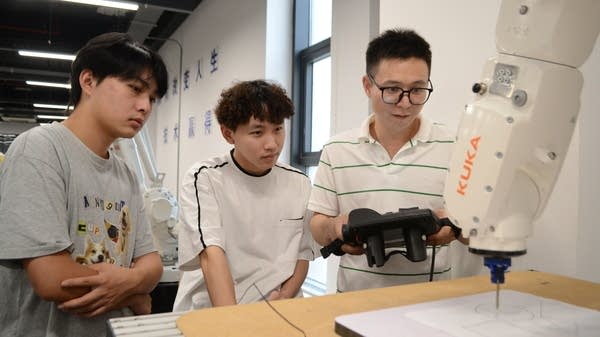AI is teaching humans to human at work
As the role of soft skills shifts amid evolving technology, that tech — especially generative AI — can be a tool to both train and assess soft skills.
![“[Chatbots] have infinite patience, and they have also been hammered with training to be polite and agreeable,” said sociologist Jason Jeffrey Jones.](https://img.apmcdn.org/55d644298b1c34ad65e4bb40b8a3b920ca6b2131/uncropped/4c3835-2024-09-gettyimages-1770683710-e1727699867954-600.jpg)
In a new AI-powered talent screening platform, job applicants are immersed in life-like work conflict, similar to a video game. But instead of casting spells or stealing cars, users of Interactive EQ are tested in different scenarios at a new job, like walking into a meeting with an upset client.
“There’s an old saying in business — ‘You never know who you’re hiring until they start working’ — and that’s what we’re trying to solve for,” said Interactive EQ founder Napolean Rumteen.
Job applicants go through this immersive video-screening process. They’re expected to offer written and verbal feedback in real time. Then, generative AI analyzes and rates how they do in categories like empathy and observation skills, or the ability to read a room.
“That’s something you can’t do in a one on one interview … or even in person,” he said.
While this technology is being used on a limited basis for now, there are many ways generative AI is being used to assess and train soft skills — though usually with fewer bells, whistles and paid actors.
At Texas Christian University, career center director Mike Caldwell said they use a job interview simulation called Big Interview.
“An interviewer pops up on the screen, asks you questions, you can basically record and practice your response to that interview as well,” Caldwell said.
The school is also experimenting with AI to analyze job descriptions, write interview questions and generate responses to the interview questions.
He said it’s a great way for students to practice talking about themselves professionally.
“You just don’t go around every day walking up to people and answering, ‘Tell me your biggest weakness,’ or ‘Tell me about a time you worked as a part of a team.’ It’s just a very unnatural process, so getting them accustomed to the rhythms of that is the most helpful,” he said.
And at Rice University, associate leadership development director Stephanie Taylor recently created a chatbot for students at the school’s Doerr Institute for New Leaders.
“You basically practice how to give feedback to people in the chatbot,” she said.
And chatbots excel at certain soft skills, said Jason Jeffrey Jones, a sociologist with Stony Brook University.
“They have infinite patience, and they have also been hammered with training to be polite and agreeable,” he said.
But generative AI has its limits too. “At some point, you’re going to need to learn to speak to other people, think on your feet while they’re giving you their body language, their disapproving glare, their quizzical expression,” Jones said. “AI is not testing you or training you on those things.”
At least not yet, he said.
AI is also impacting the capacity of career centers to connect with their students on a human level.
At Carnegie Mellon University, grunt work that once was for paid staff — like resume-building and interview training — can be done in large part by generative AI, allowing for staff to focus more on building deeper relationships with students.
“Now, we can spend more time actually getting to know our students, getting to know how they feel, how to help them navigate situations,” said Sean McGowan, employer relations director at the Carnegie Mellon career center.
Since introducing these generative AI tools, he said there’s more time to focus on other soft skills — like negotiation tactics and self-development.













